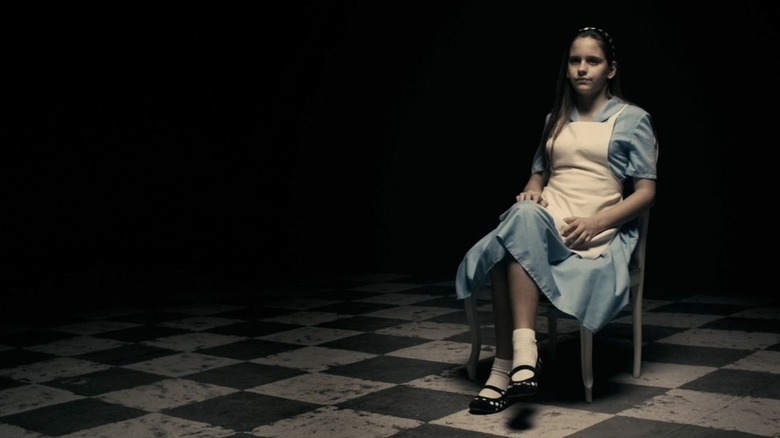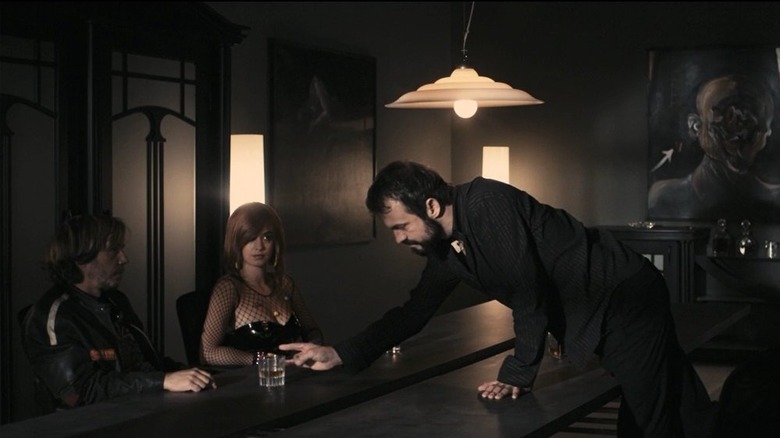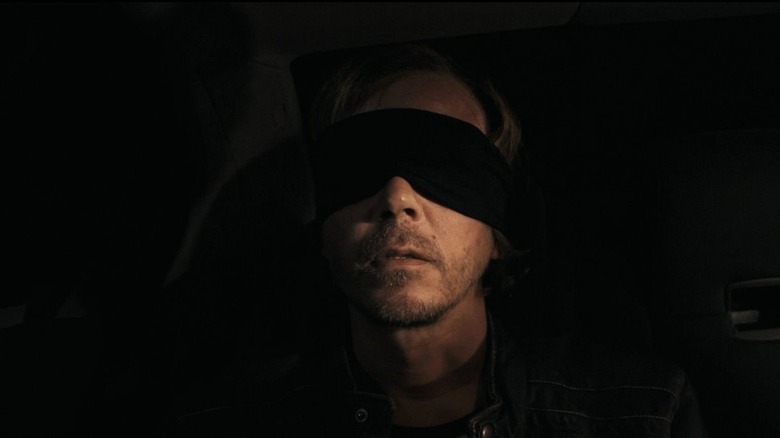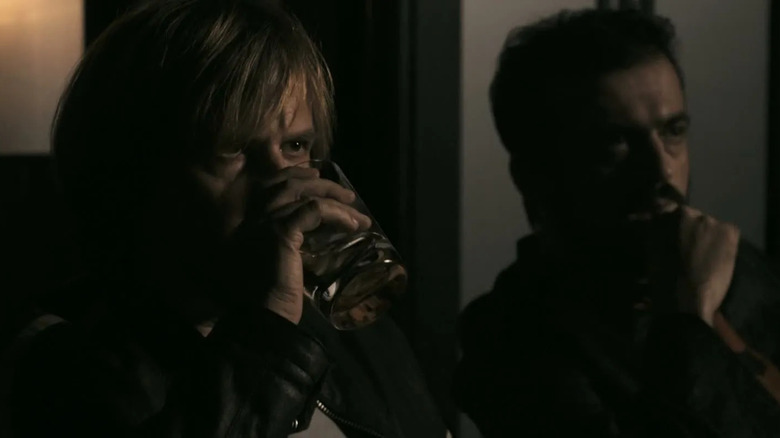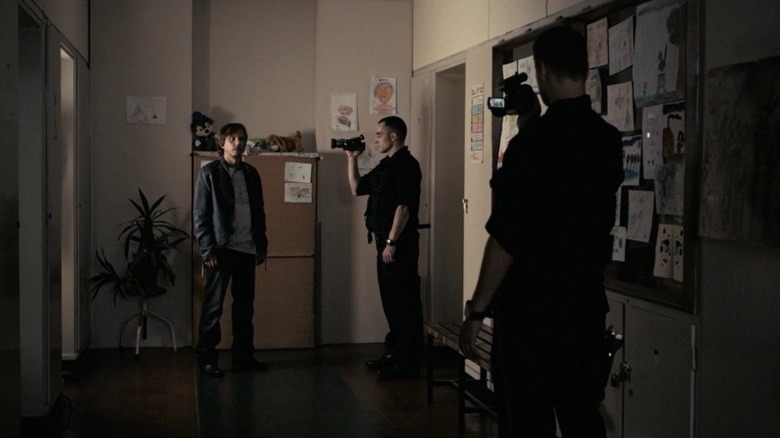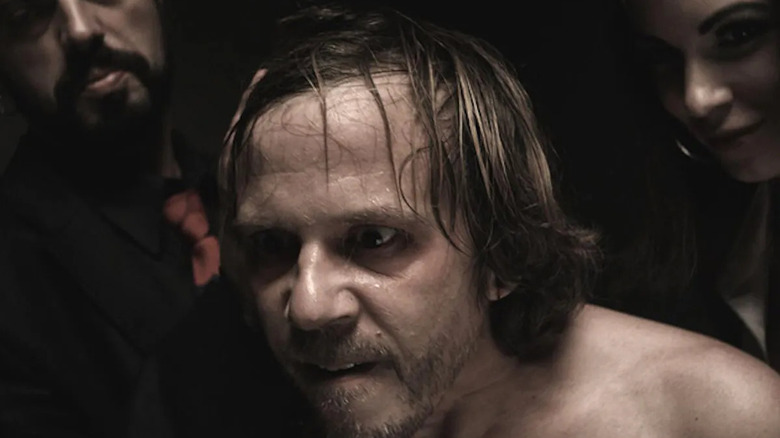Why A Serbian Film Is Misunderstood, And More Relevant Than Ever
Some films are so disgusting, repellent, violent, prurient, or tasteless that audiences find themselves unable to easily define them.
Films like Pier Paolo Pasolini's "Salò, or the 120 Days of Sodom," Lars Von Trier's "Antichrist," Gaspar Noë's "Irreversible," Ruggerio Deodato's "Cannibal Holocaust," Takashi Miike's "Ichi the Killer," Tom Six's "The Human Centipede" trilogy, or even John Waters' "Pink Flamingos" are all brazenly confrontational films, each seemingly intended not to draw the audience in, but send the audience out. To keep viewers repelled and disgusted. One might argue that such "extreme" cinema seeks not merely to elicit a visceral response from an audience — as, say, a mid-2000s torture porn film may do — but to move them to a level of disgust so intense that they cannot help but push their mind into the realm of politics and philosophy.
To state a broad point: "Extreme" horror, as the name implies, might not be as much an exercise in entertainment as it is an intellectual experiment in certain philosophical and political extremes. A wise filmmaker — if they're doing their job correctly — will certainly be making salient, vital points beyond their need to repel. Indeed, the extremity of the imagery may be so intense that certain questions will remain plain on the surface: What sort of political environment would produce such darkness? What sort of censorship will this encounter? What is being said by something so pointedly difficult?
And few films are more pointedly difficult than Srđan Spasojević's 2010 film "A Serbian Film."
The dark plot
"A Serbian Film" is, as known by those who have been brave enough to seek it out, a dark and violent film about the Serbian porn industry, but it brushes up against that most insidious of urban legends: the snuff film. It features multiple difficult scenes of extreme sexual abuse, and includes several horrifying acts inflicted on ... well, it may be better not to describe some of what happens in "A Serbian Film." Needless to say, it was censored in eight or nine countries. To this day, it remains banned in Australia. It became "one of those films" that was passed around in the cult underground, its title whispered surreptitiously into the ears of daring explorers of the deepest cinematic chasms.
"A Serbian Film" follows the misadventures of a once-big-but-now-struggling porn star named Miloš (Srđan Todorović) who, to support his wife and young son, agrees to be part of an X-rated "art" film orchestrated by a villainous benefactor named Vukmir (Sergej Trifunović). At first, it seems like Miloš is merely asked to act in "rough" sex scenes, but he soon finds that Vukmir wants also to involve underage actors. Although Miloš films a few scenes (without minors), he attempts to bow out for ethical reasons. Because this art porn project is surrounded by life-threatening mob-like secrecy, however, Miloš is forced to stay involved and he will eventually be drugged with a libido-supercharging drug that also erases his memory.
The second half of "A Serbian Film" involves Miloš piecing together what Vukmir made him do while he was under the influence. Yes, Miloš was forced to engage in some of the most hideous sexual crimes imaginable.
Slobodan Milošević
"A Serbian Film" is far more than its extremity. Indeed, if one knows Serbian history, "A Serbian Film" may read like an essay about fascism, the way artists are exploited in a post-fascist world (when the evil of capitalism may rise in its place and become just as insidious), and how certain political climates can brainwash the populace into doing horrible things during times of war. "A Serbian Film" is most explicitly about the climate created by Slobodan Milošević, who was president of Yugoslavia from 1989 to 1997. It's worth remembering that Milošević died at the Hague in 2006, having been imprisoned for war crimes.
To recall briefly: In 1989, Yugoslavia underwent an extended fracturing, the result of a violent civil war between Serbia, Croatia, and Bosnia-Herzegovina, all countries which claimed independence from Yugoslavia's rule. By 1992, the countries had all split apart, and Milošević came into power in Serbia. Milošević was, depending on which news reports one recalls from 1992, seen as both heroic and fascistic. By some accounts, like this one in Balkanologie, Milošević heroically dismantled the Serbian one-party system, allowing — at least on paper — a more varied political voice in the country. He also, however, continued to dominate like a dictator, manipulating politics and news media in favor of his own fascistic machine.
Milošević was eventually tried for crimes against humanity for the violent military actions he took in Kosovo, Croatia, and Bosnia. He was deposed in 2000, and died in prison in 2006.
Post-Milošević Serbia
After the fall of Milošević, Serbia had been slowly getting back on its feet, although not in a efficient or even positive way. It took six years for the post-Milošević government to write up a constitution, and internal bickering has kept the populace in an uneasy place. The Serbian people were, for a decade, pulled left and right by opposing political regimes, and told by competing news outlets to feel opposite extremes.
An American reader might see a parallel in certain extreme news outlets currently in operation in 2022. The Serbian populace became very cynical about their own recovering government, despite economic and social advances. Many became desperate for work, and had to take whatever gigs they could to make ends meet. The Balkonologie essay describes, more or less, a rising modern gig economy.
It was in that environment that Spasojević made "A Serbin Film." The director was seemingly making a comment on post-Milošević desperation, using shocking images to shake the audience out of their complacency. Not only was Spasojević making a frank point about the inherent integrity of sex work, but also that poverty and social climbing proliferated everywhere, coming to replace Milošević's fascism. Spasojević seemed to argue that the new economy was even more damaging for the soul of Serbia than living under the yoke of a dictator. Serbian reconstruction was, in Spasojević's eyes, a massive and hurtful sellout.
The ethics of desperation
The ethical quandary then arises: If one if hard-up for work, and the only system available requires brazenly immoral acts, how morally responsible is the individual who participates? Miloš commits a wide variety of violent crimes and immoral acts. But Miloš was drugged, how responsible is he? If his financial desperation put him in this situation, and his morality was artificially deactivated by a drug a.k.a. a system that only rewards monstrous behavior, surely he is merely a cog in an immoral machine. Given the extent of Miloš' crimes, it's hard not to see him as a monster, and he even sees himself as a monster. He will eventually be driven to extreme despair and disgust with himself.
The stranglehold of post-Milošević poverty is, "A Serbian Film" argues, merely another form of fascism. Capitalism does not provide freedom, but only new power vacuums where monsters like Vukmir can infiltrate. Milošević may have been a monster, but the post-Milošević atmosphere of Serbia allowed for a new, unexpected exploitation of the people. Spasojević seems to feel that the oppression of capitalism will naturally force you into being a monster. And not a monster we can stomach. A monster we can barely witness. To Spasojević's eye, war crimes are just as mad as capitalist crimes.
Was it necessary to go so hard?
The question arises, of course: Was the extremity of "A Serbian Film" necessary to tell this story? While such a story could easily have been told without censorship-ready levels of sexual violence, one might are that the film would not have been as powerful. After all, it retains its notoriety. With a "gentler" approach, audiences would have been granted the comfort of distancing themselves from the violence. It's just fiction, right? By being so awful and dark and extreme, audiences are not permitted to be complacent. They are shaken and shocked into paying attention. To quote the movie "Scrooged," sometimes you need to slap someone in the face to get their attention.
Ironically, the extreme violence of "A Serbian Film" is the very the thing keeping it from being recognized as a political essay. By being so aggressively repellant, "A Serbian Film" keeps many audiences away; It hardly seems like a fun film for a Friday movie night with beer and pizza. It's nearly too disgusting to casually analyze. One must have a strong constitution going in. Indeed, its extremity seems designed to appeal less to the politically interested, and more to horror fanatics and those who find value in shock. Whatever its ideas, tonally, "A Serbian Film" feels like an exploitation movie. It won't necessarily invite serious seekers of difficult art.
There is a vital commentary at work in "A Serbian Film" and it is a worthwhile political commentary. It's also a film that will actively and viscerally revile audiences, no matter how jaded they are. It's designed to be hated, which, counterintuitively keeps it from its intended audience. Brave viewers may find something deep. Those inclined to gentler things would do well to stay away.
